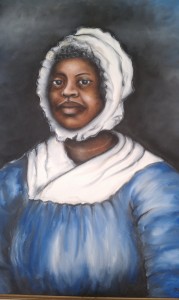The potential legal and moral import of these words
Via Heroic Women to Inspire Game Designers via Wikipedia: Elizabeth Freeman.
Elizabeth (“Mum Bett”) Freeman was a slave in Massachusetts before US independence. She protected another slave whom her mistress was about to hit with a red-hot shovel, receiving a deep wound on her arm and another on her face. She left the arm wound visible as evidence of her mistreatment. After independence, she heard (she was illiterate) the new Massachusetts state constitution, which stated that all men are born free and equal. Consulting an Abolitionist lawyer, she sued for her freedom under the constitution, and won. Her suit effectively ended slavery in Massachusetts.
The Elizabeth Freeman Center has more:
Born into slavery in 1742, she was given to the Ashley family of Sheffield, Massachusetts, in her early teens. During her period of enslavement to them, she married and had a child, Betsy. In 1780, Mrs. Ashley struck at Betsy with a heated shovel, but Bet shielded her daughter, receiving a deep wound in her arm in the process. Bet left this wound uncovered as it healed, as evidence of her harsh treatment.
Soon after the Revolutionary War, Bet heard the Massachusetts Constitution read aloud in the Ashley’s home, and heard these words from Article 1:
“All men are born free and equal, and have certain natural, essential, and unalienable rights; among which may be reckoned the right of enjoying and defending their lives and liberties; that of acquiring, possessing, and protecting property; in fine, that of seeking and obtaining their safety and happiness.”
Bet recognized the potential legal and moral import of these words and sought out an attorney to sue for her freedom under the newly ratified state constitution. With the help of Theodore Sedgwick, a Stockbridge attorney and abolitionist, she pled her case in the Court of Common Pleas in Great Barrington in August 1781. When the jury ruled in Bet’s favor, she became the first African-American woman to be set free under the Massachusetts constitution. Her case, Brom and Bett v. Ashley, served as precedent in the State Supreme Court case that brought an end to the practice of slavery in Massachusetts.
As a free woman, Bet took the name Elizabeth Freeman. She worked as a governess in the Sedgwick household until the Sedgwick children were grown, and then she and Betsy bought and moved into their own house in Stockbridge, Massachusetts, where she was widely recognized and in demand for her skills as a healer, midwife, and nurse.
She ought to be a household name.


Yes indeed she should! However, I do not intend to hold my breath until the resident so-called president recites Elizabeth Freeman’s name in one of his speeches, in his very own inimitable fashion.
Wow. You’re right, Ophelia, she should be a household name.
How is it we Americans don’t all grow up with stories about heroes like Freeman, who exemplified vaunted American values like courage and commitment to liberty and justice?
…Oh. Never mind.